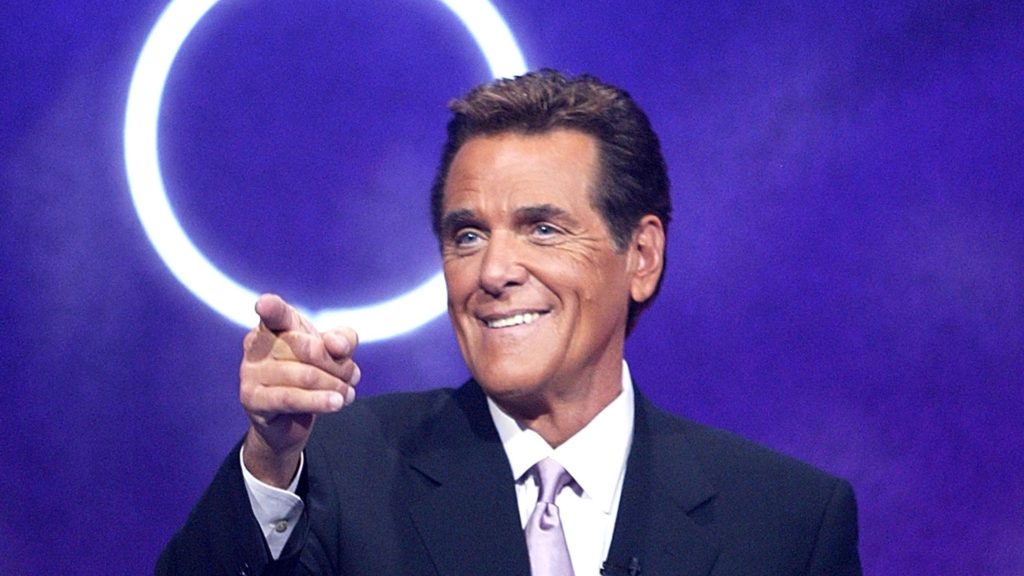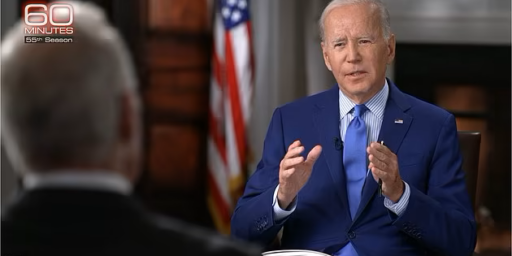Chuck Woolery Calls COVID a Hoax Days Before Son Contracts It
Life comes at you fast.

A recurring theme of critics of conservatism is that its adherents lack empathy, becoming open to new ideas only when personally impacted. Whether that’s true generally is debatable but this week gave us yet another anecdote.
NBC News (“Chuck Woolery says ‘everyone is lying’ about coronavirus, then reveals son’s COVID-19 diagnosis“):
Former game show host Chuck Woolery, who tweeted Sunday that “Everyone is lying” about COVID-19, including the media, Democrats and the Centers for Disease Control and Prevention, said a day later that his son was diagnosed with the disease.
His Twitter account no longer existed on Wednesday.
“The most outrageous lies are the ones about Covid 19. Everyone is lying. The CDC, Media, Democrats, our Doctors, not all but most, that we are told to trust,” Woolery wrote Sunday night without citing evidence.
“I think it’s all about the election and keeping the economy from coming back, which is about the election. I’m sick of it,” he added.
His tweet was retweeted by President Donald Trump.
On Monday afternoon, Woolery said his son tested positive for COVID-19, the disease caused by the coronavirus.
“To further clarify and add perspective, Covid-19 is real and it is here. My son tested positive for the virus,” Woolery tweeted, adding that he feels for “those suffering and especially for those who have lost loved ones.”
I grew up watching Woolery, who was the original host of Wheel of Fortune (1975-1981) and Love Connection (1983-1994) but haven’t paid much attention to him in recent decades.
Granting that he’s getting up there—he’s 79 and born more than two years before my parents, both of whom have passed—it’s just incomprehensible to me that he seriously thought a virus that has infected nearly four million Americans and killed some 142,080 was a “hoax.” Even President Trump quit pretending so months ago (although it didn’t keep him from retweeting Woolery’s nonsense).
He has two living sons, from his third marriage, but Woolery did not reveal which one was diagnosed with the disease. Obviously, one wishes him a speedy recovery.
But sheesh.






For an informal survey of non-anecdotal research on the link between empathy and conservatism, see:
Empathy and the Liberal-Conservative Political Divide in the U.S.
Obviously the claim is not that liberals have empathy and conservatives don’t, but the research has consistently found that liberals have more empathy than conservatives on average, and that lower levels of empathy correlate directly with specific positions that one wouldn’t at first think were related to empathy (e.g. climate change denial).
I keep saying it’s the karma virus.
I’d argue that the absence of imagination is the underlying cause that manifests as a lack of empathy for anyone not a member of one’s family or in-group. Conservatives are not capable of imagining themselves as anything other than what they are, or at least what they think they are. They are not able to project alternate possibilities. They are not able to imagine.
Lack of imagination, the inability to propose alternate futures, explains why the only vision of the future conservatives ever offer is a bowdlerized nostalgia. It was not a conservative who first suggested to his fellow cave men that there might be something interesting in this new fire substance. If you can’t imagine things as different than they are, then you can’t imagine yourself having a gay child, or a daughter needing an abortion, or see yourself as homeless. Imagination creates empathy.
Imagination, and its offspring, empathy, manifests in the political arena as liberalism.
Look at how few conservatives are involved in creative endeavors. The conservative’s notion of a creative is Scott Adams, still drawing the same mildly-amusing comic strip for 30 fucking years. In that same 30 years I wrote 150 books, most in 14 separate book series, ranging from middle-grade to adult, in fantasy, romance, science fiction, horror, humor, mystery, and alternate history. I’d hang myself if I were Scott Adams. 30 years! Of Dilbert! No wonder he’s lost his simple little mind.
How many conservatives write, paint, sculpt, design, compose, choreograph, act or film? Damn few. They don’t have the chops. They can’t have the chops, because if they did they wouldn’t be conservatives in the first place.
@Michael Reynolds:
There but for fortune.
https://youtu.be/7cEQZ_HWeYg
@Michael Reynolds: This is rather full of empty self-congratulation disguised as anecdotal analysis, even for you.
I find the discussion around “conservative” versus not to be rather sterile since it essentializes as a falsely fixed state a fuzzy poorly defined transitive personality property, largely for the purposes of partisan self-congratulation which frankly illuminates not-at-all.
Without a rather better definitions of what are meant by the terms, it is all rather Just So Stories so typical of faddish Pop Psi.
(I shall note that I can well credit a real certain relationship and particularly in respect to social lower c conservatism, Pop Sci Just So Stories have a long history of being over-done sh*t*)
Life comes at you fast.
@Michael Reynolds: Well put. I think this lack of imagination also explains the liberal leanings of most real journalists (I don’t count pundits as journalists). In order to find the truth in human events you need to be able to put yourself in the place of all the participants and imagine their motives and thought processes. Conservative investigative journalists are much more likely to go in with an ordained truth and cherry pick anecdotes and edits to create their pieces. That’s not journalism, it’s propaganda.
@Lounsbury: It’s easy to overdo this sort of analysis. But the anecdotal evidence of people who opposed gay marriage, transgender rights, etc. until finding out their child was gay/transgender is astonishing. Ditto the “As a father/husband I see women as people” trope.
@Lounsbury: I might be inclined to agree with you but, at least since the early 60’s, there are myriad direct connections between those who call themselves conservative, from Goldwater to Buckley to Buchanan To McConnell or Buchanan, and all of these self identified conservatives absolutely demonstrate the characteristics Reynolds describes.
I come back to something Conservatives/Republicans have been doing for at least two decades, which is how long I’ve noticed it. Whenever one of them starts talking about expanding their base it is always followed by a call to better explain the benefits of Conservative policies. In twenty years I have not once heard a Republican/Conservative express any need to learn from these out groups. It simply does not occur to them that someone else’s perspective could have value. On the contrary, if you don’t think like them, then you are wrong and need to be educated.
@Lounsbury:
Of course you dismiss it, you are temperamentally a conservative. Dismissive scorn is the go-to for your sort. You dismiss what you can’t understand, what you can’t do. Rather nicely illustrating my point.
Conservatives aren’t the only ones who think that. Jus’ sayin’.
Then it’s you in denial, James. This is still the Trumpist/GOP party line line, and the explanation for all those intentional idiots not wearing masks with full hatred of those who do.
One-in-four people in Arizona are testing positive for COVID-19, but they are still screaming in protests that all of this is nothing more than a Democratic hoax to injure the president’s great work.
Maga? Doesn’t look like it’s working at all.
@OzarkHillbilly: Absolutely. Especially, but not exclusively, amongst young idealists of all stripes. “Why can’t you see that this thing I just discovered is the most important thing in the world! Why are you wasting time talking about anything else!”, is a pretty common occurrence across all ideologies. But most people grow out of this, even conservatives. But whereas liberals tend to back off as they realize the world is more complex then they realized, while conservatives retain their simple world view while just losing their drive.
But, yeah, I listened last night to my very liberal daughter declare that she would no longer support a particular WSL team because their star stood instead of knelt during the anthem last night.
What I’ve been saying about Covid and the resistance to taking it seriously is reminding myself, and others, that this is a country where we celebrated the “I’m from Missouri” personality. The “show me” skepticism. The “screenshots or it didn’t happen” crowd. I consider skepticism like that to be fairly healthy. I see two places where it goes wrong.
If you won’t believe in anything until its in your face, then a pandemic like this is going to be rough on you. Because there is nothing to see. Germs are invisible. You carry and spread the disease without knowing you are sick too. Right up until you get sick with it, or a family member does, you can go on doubting.
And, many many people have amplified that skepticism into “I’m never gonna believe what those people say”. Because they are the enemy. This has been useful politically until now. And now it’s boomerang time.
@MarkedMan: My sons were always pretty good at listening, and actually hearing, but they came out of a difficult situation, going on to have some pretty broad experiences, now living lives that are uniquely their own. They are pretty liberal, maybe even more so than I, but they have conservative people in their lives and they can discuss things without getting angry.
@Michael Reynolds:
Do you have to be creative to win a Nobel Prize in literature? Because there have been conservatives who’ve won it over the century (though not American conservatives, and arguably that’s a different thing).
I think you ignore the evil option. It’s very possible to be highly creative and imaginative, able to put yourself in someone else’s shoes and then decide you simply don’t care — ie life is pain. Thinking opponents are stupid and uncreative is the kind of overconfidence that leads to big losses. Moreover, conservatives have been doing fairly well for a very long time — how could that be possible if at least some of them weren’t intelligent and creative?
In Dungeons and Dragons the saying is “I’m Chaotic Evil, not Chaotic Stupid”. You’re assuming people doing evil are stupid, but they’d be much less dangerous if that were true. The trouble is many evil doers are very intelligent and imaginative. If Hitler’s Nazi’s were really as stupid and unimaginative as portrayed in “Hogan’s Heroes” they would have lost WW2 in the first week.
In terms of people calling it a hoax, a lot of that is wishful thinking, much like denying climate change or buying lottery tickets. Humans are quite good at intellectually knowing something is wrong, but still believing deep down that its true.
@Northerner:
I never dismiss evil. It’s true that some people can imagine another person’s suffering and revel in it. But I think the more common phenomenon is people who do evil because they are incapable of empathy and are, in their view, simply doing the logical thing. It’s a subtle difference I suppose between heedless evil and knowing evil. But you’d be hard put to come up with many people who admit to doing a bad thing, they always rationalize and justify.
Related is the inability of conservatives to learn from their past errors. A conservative will move directly from, ‘Ah hates fag*ots,’ to, ‘fag*ots is just fine,’ without ever considering that they might be wrong about the next thing or group they hate. Dick Cheney suddenly discovered lesbians were OK thirty seconds after his daughter came out. But if his grandson came out as trans he’d dismiss and deride without any self-awareness, without self-doubt. A conservative’s empathy only extends to his in-group because, again, he lacks the imagination needed to expand that tiny circle of empathy.
I don’t think this suggests liberals are necessarily more intelligent. Identical iPhones with different apps. I lack the app for math. I have the app for imagination. People get very irritated when you suggest they lack a capacity for imagination, it’s an insult on a par with telling someone they have no sense of humor, but for some reason it’s acceptable for me to admit my math app stops at long division.
“Granting that he’s getting up there”
Irrelevant — I’m getting up there, too, as are many of my friends and relatives. We manage to stay rational and reasonably well-informed despite that.
@Lynn:
I agree. Old age is not an excuse to be an asshole. Contra the clichés I’ve been moving Left as I age and become more financially stable.
@Michael Reynolds:
And…Donald Trump didn’t become a stupid, boorish buffoon in old age. He’s always been one.
@Michael Reynolds: I think you’ve also recognized when you’ve stumbled into good fortune that allowed you to use your talents, and that a lot of other people haven’t been so fortunate, sometimes for systemic reasons.
That’s something a lot of people on the right fail to see. There’s an assumption that if one person can thrive, then everyone can thrive. Clarence Thomas proves that any black man can rise to the top, so the rest must be lazy.
We’ve had discussions in these threads on the difficulty of defining “conservative” in politics, which has essentially nothing to do with the dictionary definition of “conservative” in non-political usage.
My understanding, open to correction by anyone with actual expertise, is that the psych people were trying to investigate the psychological traits associated with conservatism, but found they couldn’t come up with a consistent definition of conservatism that held up over time and geography. They didn’t want to define it in psychological terms because then the whole exercise becomes circular, but finally conceded there was no other workable way to define conservative.
I’ll again recommend Corey Robin’s The Reactionary Mind: Conservatism from Edmund Burke to Donald Trump. As the subtitle says, he surveys conservatism from Burke to the present and concludes the only consistent position is, as the meme says, opposition to whatever liberals are for.
@Michael Reynolds: I agree with you, up to the point of using the word “conservative” to describe that kind of person. Radical right, nativist, fascist — I think those are more accurate labels. Conservatism in the mold of Edmund Burke? Not so much.
Burke was an educated person who thought that the UK was fighting a losing battle in the colonies. He feared the French Revolution because he felt that revolutions easily let the worst sorts rise to the top. History bore him out, not only because of the Jacobins, but also the Daniel Ortegas and Pol Pots of the world. Hardly a person with little imagination, looking ahead to what might happen in France.
Nor would I say that George Will is a person who lacks imagination. In the last days of the USSR, he said that Russia should secede from the Soviet Union. Sam Donaldson and David Brinkley looked completely gobsmacked at Will, but he was right to identify the rising nationalism that would drive the Soviet Union apart.
Now, when we’re talking about a certain type of contemporary Republican — Ted Cruz, Tom Cotton, Chad Wolf, Betsy DeVos, Ann Coulter, Laura Ingraham, etc. etc. — I’m totally with you. They lack imagination, which is a prerequisite of both intelligence and compassion. I just wouldn’t sort them into the same basket as traditional conservatives.
Worth reading on how “conservatives” differ:
https://www.theatlantic.com/ideas/archive/2020/07/laura-ingrahams-descent-into-despair/614245/
@Michael Reynolds:
You’re probably right about people not considering themselves evil. However I think that’s because different people have different definitions of what is evil (both as individuals and as societies). Two different people could look at the same act (say someone looking out for themselves at the expense of others) and one might say that’s evil and another might say that’s the natural order and so not evil.
In terms of conservatives lacking imagination, even one of my favorite children book authors (Rudyard Kipling who wrote “The Jungle Book” as well as some very prejudiced works — though for me his prejudiced works don’t spoil “The Jungle Book” which I think is a magical piece of writing) was a very staunch conservative. As well, some of the greatest inventors in history were conservatives (Henry Ford, William Schockley was a main figure on the invention of the transistor etc, Fritz Haber who both developed poisonous gas weapons in the first world war and the process behind nitrogen fixation that feeds much of the world today … actually its interesting how many people did both great good and great evil). They all seemed to not only have the imagination app, but a very powerful version of it.
I think imagination, like technology, tends to be neutral — it can be used for great good and for great evil (and as I said, often by the same person). Maybe its a question of genius coming up with ideas, and then their ethics deciding whether to implement them or not.
@MarkedMan:
An elderly relative I had who voted for Trump used to try to lecture me on physics, despite the fact that I have a degree in the subject and he barely graduated high school. It’s like he had no ability to imagine that he could be wrong on things, if he thought it, it was obviously correct
But they can’t even try to do that anymore, as their policies are often opposed by a majority (or at least a plurality) of Americans…
@Kingdaddy:
US conservatism today is more revanchist that classically conservative.
@Kingdaddy:
Here (and with @Northerner) we run into the definition of conservative. We both know we’re not dealing with Burkeans anymore. George Will may be the last surviving member of that tribe.
The term ‘conservative’ has lost just about all of its original meaning in this era, so I use it in a very broad way since we don’t seem to have quite evolved a new set of definitions. And it follows that whatever we mean by conservative today, it’s only very vaguely related to the term as used in, say, Victorian Britain.
@Northerner:
There’s a difference between extrapolation and imagination, or between imagination and efficiency. There’s: what if we could streamline production in these three ways? And: what if a rabbit in a hurry was to lead a young girl down a hole into an alternate reality?
In my little world I’d classify those as editing and writing respectively. Not a knock on editors at all, they’ve saved my ass on numerous occasions, but they know the difference. One uses what’s there and organizes and reshapes it. Then there’s this:
@Lounsbury:
Yeah, I’m thinking you picked the wrong fight with the wrong person on this one. I, for one, applaud and admire accomplishment, individual or collective.
@Michael Reynolds:
Your distinction between editors and writers seems workable to me. Henry Ford and William Schockley were both mainly editors by that division, synthesizing other people’s research, but Kipling and Haber were clearly writers (Haber’s work was original rather than a synthesis of previous researcher’s work). Interestingly enough, Lewis Carrol was also a conservative. As was CS Lewis, another still popular children’s writer.
Which brings back your point about the term conservative having lost its definition is a good one — it applies both to people like Ted Cruz and to Angel Merkel though I suspect Merkel would not be happy about that grouping.
@Northerner: I would say that every scientist flips back and forth between “writing” and “editing” modes. First it’s coming up with the new ideas, then one moves over to the criticism mode and starts finding problems with the ideas. Then it’s back to finding solutions to the problems (or, if the problems are horrible enough, just dropping the original idea), then back to the problems with the solutions to the problems….unsoweiter.
(I remember bitching to my (physicist) boyfriend at one point about the difficulty of working in theoretical physics. He looked at me and said: “Ninety-five percent of the time you’re going to be running up blind alleys and failing. Either get used to it, or get out of the field.” )
@Northerner:
The term conservative is slippery even confined to the current American context. Kipling was certainly an imperialist, but as a Mason would have rejected (or been rejected by) the evangelicals who form the core of current American conservatism. He’d have likely classified the typical Mississippian as one of those backward folks requiring the civilizing influence of English imperialism.
Then there’s someone like Dali, who supported Franco, but in a context where the fight was not between liberals and conservatives but communists and fascists.
And of course Edmund Burke, a Whig, would in some ways have been called a liberal for his opposition to slavery and support for the American colonies. Needless to say he wouldn’t have let a Trump supporter shine his shoes.
We’re going to need new terminology going forward. The whole Left and Right paradigm came out of the French revolution and the national assembly and within a very few years the terms no longer meant what they had started out meaning.
I’m not sufficiently well-read to parse all the differences between the various movements called ‘conservative’ or ‘liberal’ at one point or another. At present in the US it is the liberals who want to conserve the pre-existing order and the conservatives who want radical change.
@Michael Reynolds: I also seem to remember that Kipling’s attitude changed drastically after his beloved son died in WWI.
A lot of people became much more cynical about “–isms” and governments after all the promises made (“Home by Christmas”) and then the total incompetence with which the war campaigns were carried out. There’s a collection of reports from old WWI veterans and civilians over on one of the BBC history sites and the disdain they now have looking back on their experiences is palatable. I wonder if Trump and his enablers and the coronavirus will end up considered similarly 50 years from now.
@Michael Reynolds:
I think you’re right about needing new terminology — the old one simply doesn’t fit anymore. Worse, it lumps people together on the same “team” who have little in common with each other and encourages them to vote in unity despite conflicting goals (most people vote for their “team” rather than by going through the issues and seeing which candidate matches them the best.
As you say, by his day’s standards Kipling wasn’t nearly as conservative as by our standards — its just that today we tend to judge people from past times by today’s standards, so its natural to call him conservative. We need new terms.
@Michael Reynolds:
Nevertheless, there have been creative giants who were deeply conservative. G. K. Chesterton springs to mind.
@DrDaveT:
Out of curiosity I Googled conservative artists and musicians — some very big names came up even in recent times (ie Mozart was conservative but that hardly counts today). The Beach Boys did fundraisers for Republicans, Neil Peart was a libertarian (not sure if that’s strictly conservative or not), Alice Cooper, Johnny Ramone, Salvador Dali … of course most of these were old-school conservative supporters, so again like Reynolds said, we need new terms.
@Northerner:
An aptitude test I took in high school said I should be an editor.
I did not pursue that path.
But, looking back, I would have done that well.
I pay attention to AP stylebook updates. How many civilians do that?
@Northerner: I posit my utilization of the terms ‘conservative’ or’ liberal’ based on brain cognition studies, especially regarding stroke damage. A stroke on the right hemisphere frequently results in body awareness issues, such that rationalizations are required to explain why a body part no longer obeys the patient’s signals for initiating movement. This rationalization appears to occur due to inability of the brain to process the novel data regarding what I think of as the ‘steady state’, or conserved body image. Brain function varies due to a combination of genetic wiring, learning, habit, and damage, such that human cognitive function will include a spectrum of ability to input new information in order to form and update their world view. Some people will encounter difficulty on up to being physically unable to update their worldview based on external data, and only internal states are capable of affecting their comprehension of how the ‘world’ works. I’m sure there are multiple factors, but the need to rationalize and inability to process data and expand their world view is as much biological as social.
@ASGM:
I’m sure there are multiple factors, but the need to rationalize and inability to process data and expand their world view is as much biological as social.